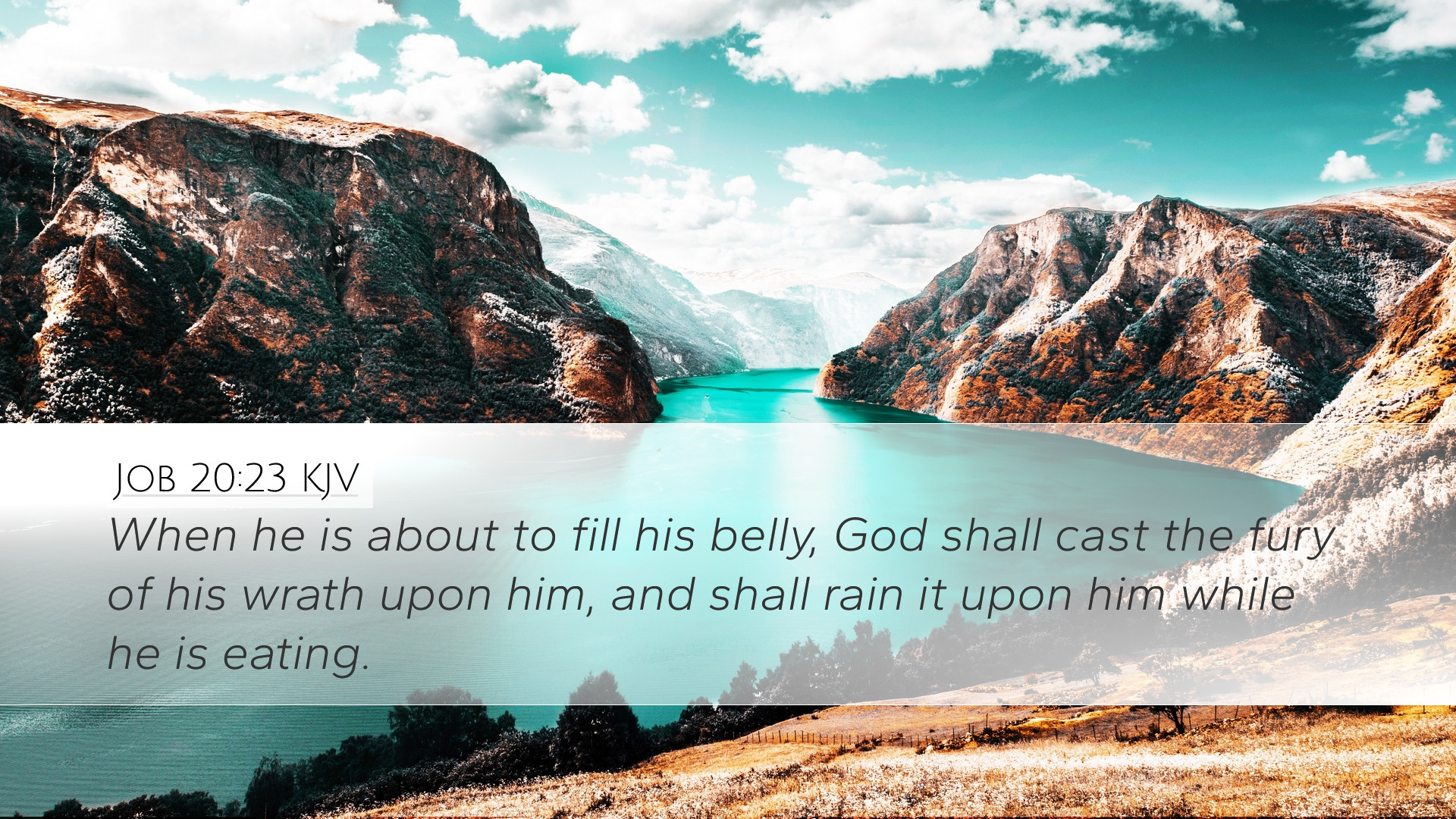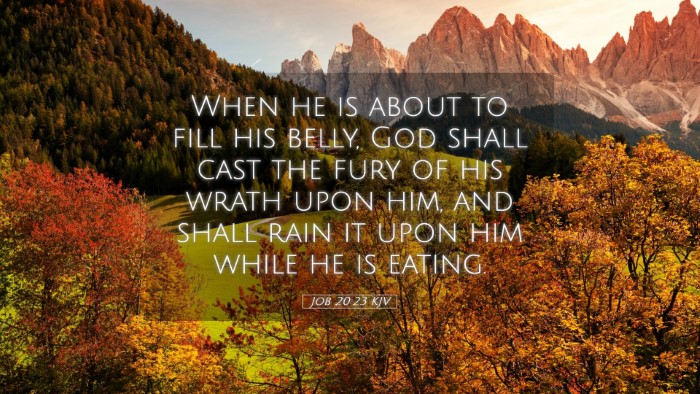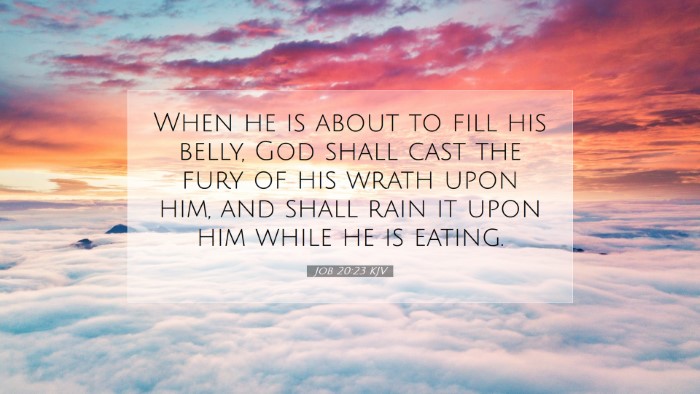Old Testament
Genesis Exodus Leviticus Numbers Deuteronomy Joshua Judges Ruth 1 Samuel 2 Samuel 1 Kings 2 Kings 1 Chronicles 2 Chronicles Ezra Nehemiah Esther Job Psalms Proverbs Ecclesiastes Song of Solomon Isaiah Jeremiah Lamentations Ezekiel Daniel Hosea Joel Amos Obadiah Jonah Micah Nahum Habakkuk Zephaniah Haggai Zechariah MalachiJob 20:23
Job 20:23 KJV
When he is about to fill his belly, God shall cast the fury of his wrath upon him, and shall rain it upon him while he is eating.
Job 20:23 Bible Commentary
Commentary on Job 20:23
Job 20:23 (KJV): "When he is about to fill his belly, God shall cast the fury of his wrath upon him, and shall rain it upon him while he is eating."
Introduction
Job 20:23 offers a sobering depiction of God's impending judgment on the wicked, emphasizing the suddenness and inevitability of divine retribution. This verse is part of Zophar's response to Job, wherein he articulates the fate of the wicked in stark terms, consolidating the theme of divine justice that pervades the book of Job. Public domain commentaries provide valuable insights into the theological implications and moral lessons drawn from this passage.
Contextual Background
The book of Job poses profound questions about suffering, justice, and the nature of God. Zophar, one of Job's friends, represents the perspective that suffering is a direct consequence of sin. In his discourse, he aims to reinforce the idea of God's judgment against the wicked, using vivid imagery to depict their fate, particularly in the context of physical sustenance and consumption.
Exegesis of Job 20:23
The structure of Job 20:23 emphasizes the juxtaposition of the wicked's anticipated prosperity against God's sovereign intervention. The phrase "When he is about to fill his belly" symbolizes the moment of worldly satisfaction and fulfillment. It reflects a high point in the life of the evil person, indicating their confidence and security in the abundance they possess.
God’s Intervention
The subsequent clause, "God shall cast the fury of his wrath upon him," signifies a dramatic reversal of fortunes. Here, God is portrayed as actively engaged in the affairs of humanity, asserting that His wrath is not only a possibility but is certain to intervene when the wicked least expect it. This reflects the overarching theme of divine sovereignty that permeates the entire text of Job.
Imagery of Sudden Judgment
The phrase "and shall rain it upon him while he is eating" evokes the imagery of surprise and irrevocable consequence. The use of the word "rain" suggests a sudden downpour that overwhelms, indicative of God's judgment that descends upon the wicked unexpectedly, thereby emphasizing the futility of their security based on material gain. This is a powerful reminder of the transient nature of earthly pleasures contrasted with eternal realities.
Theological Reflections
This verse raises essential questions concerning the nature of divine justice. Zophar implies that the prosperity of the wicked is temporary and that their fate is ultimately destruction at God’s hands. This insight resonates with various scriptural passages about the fleeting nature of worldly riches and the ultimate accountability individuals have before God.
- The Justice of God: God’s character is fundamentally just, and His judgments are executed in perfect righteousness. Zophar’s assertion reflects this theological conviction.
- Human Vanity: In illustrating the downfall of the wicked, this verse prompts readers to examine their own lives, challenging them to consider the security they place in worldly pursuits.
Insights from Commentators
Several prominent biblical scholars provide additional insights into Job 20:23:
Matthew Henry's Commentary
Henry emphasizes the unstoppable nature of divine justice, noting that the wicked may enjoy a moment of abundance, yet are never beyond God’s reach. He writes, "God’s wrath is as inevitable as it is just; it can strike at any moment, proving that earthly pleasures cannot shield one from divine condemnation."
Albert Barnes' Notes
Barnes highlights the certainty of God's retribution, suggesting that the wicked should not presume upon their present comforts, as they are mere precursors to divine judgment. He asserts, "The allusion to eating underscores the alarm that even amidst comfort, God’s judgment can disrupt and dismantle their seeming tranquility."
Adam Clarke's Commentary
Clarke elaborates on the volatility of the wicked’s state, cautioning against complacency. He affirms, "This verse serves as a warning that those who indulge in sin often lack awareness of the consequences looming ahead. The destruction that follows often comes suddenly, catching them unprepared."
Practical Applications
Academics, pastors, and students can draw various applications from Job 20:23:
- Call to Reflection: This verse invites introspection regarding personal priorities and reliance on material gain. It encourages the faithful to remain vigilant in their walk with God.
- Warning against Complacency: Like Zophar’s warnings, this scripture serves as a solemn reminder to those who walk in disobedience that judgment is certain and often comes at the moment of greatest pride.
- Hope in Justice: For those enduring suffering or injustice, Job 20:23 reassures believers that God is attentive to the scales of justice, and that wrongful deeds will not go unpunished.
Conclusion
Job 20:23 encapsulates a profound and timeless truth about the nature of divine justice in the face of human sin. Through the insights of various commentators, we are reminded of God's sovereignty, the fleeting nature of earthly satisfaction, and the inevitability of His judgment. As one reflects on this verse, let it serve as both a warning and a hopeful reminder of the moral order established by God in the universe.


